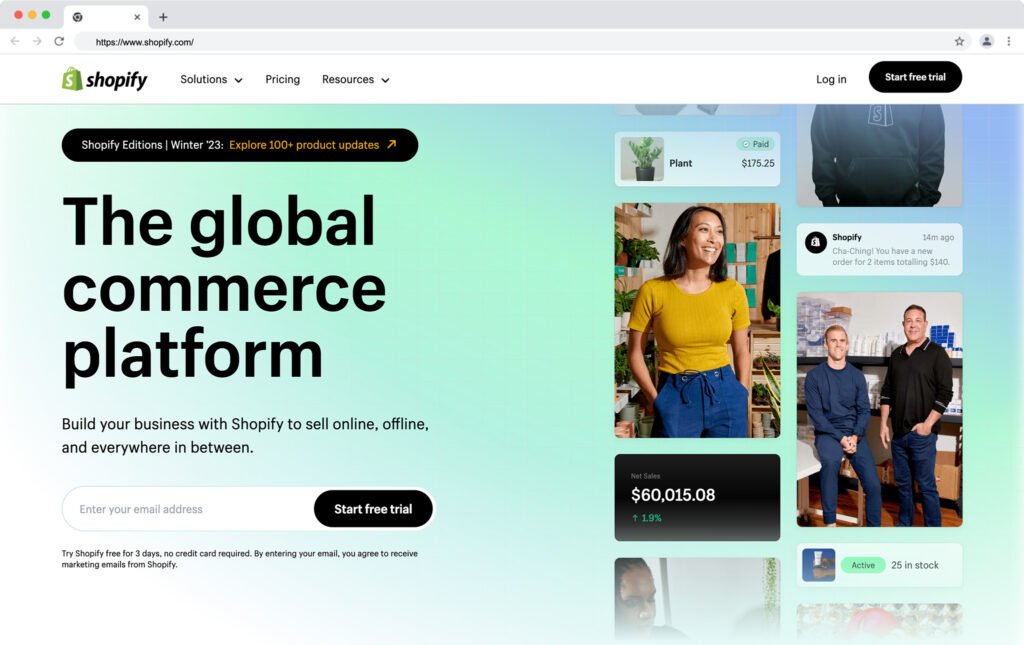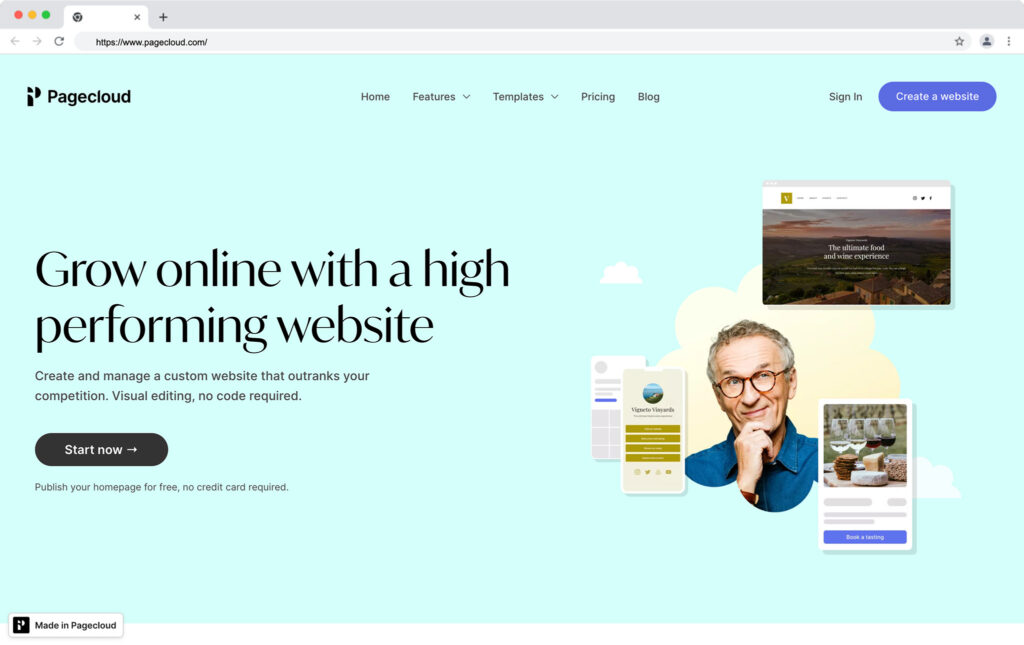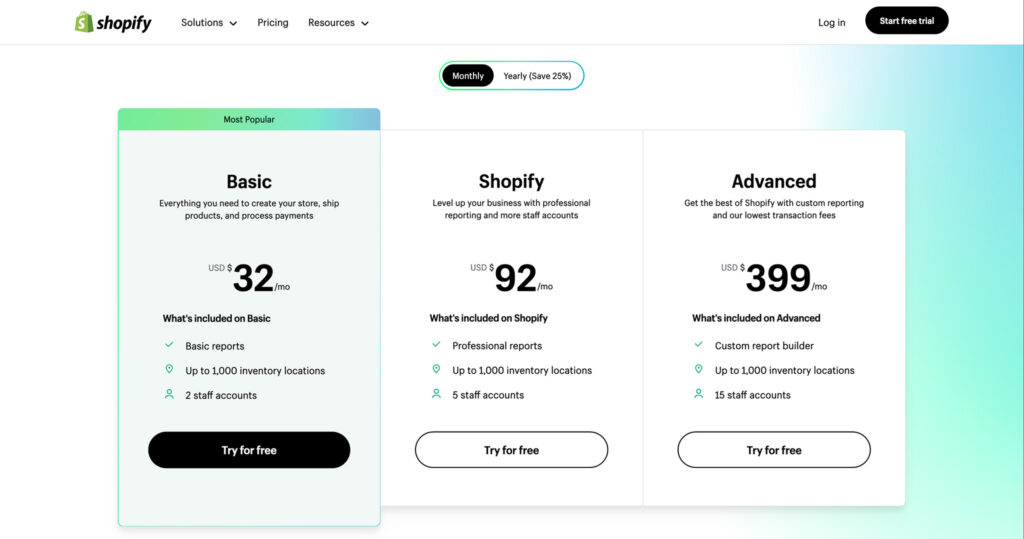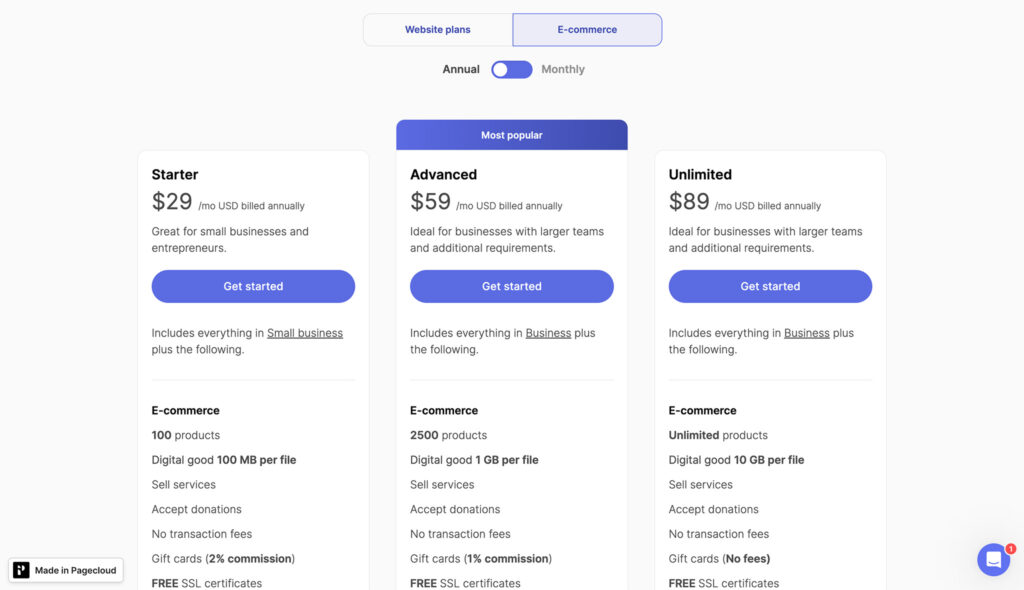Pagecloud vs Shopify: which solution should you be using in 2023?
Both Pagecloud and Shopify are powerful tools for would-be ecommerce store owners. Although they have a slightly different set of features and functionalities, both tools are straightforward, relatively easy to use, and extremely flexible, making them excellent choices for a range of companies.
The challenge is figuring out which tool you want to get started with.
What is Shopify?
Shopify is widely considered by many to be the go-to tool for ecommerce store building. Easily one of the most powerful platforms on the market, Shopify allows business owners to sell virtually any product or service imaginable. You can create memberships, sell one-off-products, and even design your own dropshipping business with Shopify.
What is Pagecloud?
Pagecloud is an intuitive site builder, based in the cloud, which eliminates the need for extensive coding knowledge. You can connect your site to all of your social platforms, to connect with your audiences anywhere, sell products and services online, and even track your inventory and sales.
Let’s take a closer look at what each of the two solutions can offer.
Pros and Cons of Pagecloud and Shopify
Both Pagecloud and Shopify are excellent tools for entrepreneurs. However, like all resources for site building, they have their own unique pros and cons to consider. Notably, both of these tools do have quite a lot in common. They’ll each allow you to build virtually any kind of website you could want, from an online portfolio to a membership site.
Additionally, both Pagecloud and Shopify support simple online selling, with access to a range of payment options, inventory tracking and more.
Shopify, however, is a far more scalable service, with a wider range of options for growing businesses, while Pagecloud is intended more for beginners in the ecommerce space. Let’s look at some of the pros and cons for each solution.
Shopify Pros and Cons
Pros 👍
- Wide range of ecommerce options
- Powerful and scalable site builder
- Easy to use environment
- Lots of different integrations and add-ons
- Multi-channel selling (with multiple currencies)
- Excellent community and customer support
- Various theme and customization options
- Secure sales
- Analytics and reporting built-in
- Integrations with social media
Cons 👎
- Expensive plans for larger companies
- Transaction fees on most plans
- Difficult to change templates
Pagecloud Pros and Cons
Pros 👍
- Lots of beautifully designed templates
- Easy-to-use environment for beginners
- Simple and transparent pricing
- Lots of customization options
- Great for working collaboratively with designers
- Multiple sales and ecommerce options
- Excellent guidance for beginners
Cons 👎
- Less scalable for larger sites
- Templates aren’t always mobile responsive
- Add-ons require third-party accounts
Shopify vs Pagecloud: Background Info
Before we dive into a full overview of the features and functionality you can expect from both Pagecloud and Shopify, it’s worth taking a closer look at the background of the two solutions. Shopify is a slightly better-known tool for entrepreneurs, because it’s been around for a lot longer than Pagecloud. The solution was initially launched in 2006, and has a headquarters in Canada.
Around the world, Shopify has earned a reputation as one of the most flexible, and feature-rich ecommerce website builders available. It has a huge marketplace full of integrations and add-ons to take your store to the next level. Plus, Shopify allows companies to run their store on virtually any kind of business model, there’s even support for print-on-demand and dropshipping.

Further reading 📚
Pagecloud was initially founded in 2014, and launched officially in 2015. It’s also a Canada-based company, with a strong focus on helping companies with limited coding knowledge and expertise to get started online. Pagecloud already supports countless businesses across 130 countries, promising everything from a convenient drag-and-drop website builder to fantastic support.

Pagecloud, like Shopify, has a range of apps and integrations to choose from, as well as various bonus tools, such as a keyword research solution, and link-in-bio service. There are also dedicated templates and wireframes available for companies from every industry.
Shopify vs Pagecloud: Basic Features
On the surface, Pagecloud and Shopify are very similar tools, both intended to simplify the process of building an effective online presence. Both tools allow users to sell both physical items and services online. Plus, they both come with convenient, code-free tools for designing an effective online presence. Some of the features you’ll find with both tools include:
- Ecommerce support: Both Shopify and Pagecloud support companies in selling both products and services online. You can create memberships, sell one-off services, book appointments with customers, and ship products to locations around the world. There are also various checkout and payment options available.
- Templates and customization: With both Shopify and Pagecloud, there are various templates, themes, and tools to help you start designing your online presence. Shopify and Pagecloud have templates created for specific industries, as well as customizable wireframes. You can also build a custom site entirely from scratch if you choose.
- Payment gateways: For payments, Pagecloud has 40+ payment gateways available, with support for common options like Visa, Apple Pay, and American Express. Shopify has more than 100 payment options, including its own dedicated payment processing solution, which removes the need to pay any transaction fees.
- Site building: Both Pagecloud and Shopify offer a drag-and-drop site building solution, so you can easily customize the appearance of your site according to your specific needs. However, Shopify is the only tool that also offers headless commerce options via Shopify Plus, if you want to create a truly unique selling experience.
- Integrations: When it comes to apps and integrations, both Pagecloud and Shopify will work with most of your preferred apps. Pagecloud has integrations for everything from analytics to donations, and podcast hosting. However, Shopify’s huge marketplace does make it a little more appealing for those who have numerous tools they want to connect.
- Security: For peace of mind, Pagecloud and Shopify have a range of dedicated security and privacy solutions. Pagecloud adheres to all of the latest compliance standards, and comes with features to help manage who should be able to access each tool on your site. Shopify is similarly advanced for security, with single sign-on, PCI tools, and encryption options.
- Responsivity: All of Shopify’s templates are designed to be mobile responsive. While Pagecloud does have a few less responsive templates, most of its tools are intended for use on any platform. Shopify does have its own mobile app for managing your site, however.
- Omnichannel: For omnichannel selling, both Shopify and Pagecloud integrate with a range of social media tools and other ecommerce platforms. However, Shopify does have a few more options to offer if you’re interested in dropshipping and print on demand.
- Inventory management: Both Pagecloud and Shopify offer basic tools for managing your digital and physical products online. Both tools can help protect your files online, and give you insights into your top-selling products.
- Analytics and reporting: While both Pagecloud and Shopify offer reporting and analytics tools, most of the best insights you’ll get on Pagecloud will come from integrations with analytical tools. Shopify has more reporting options built-in.
Pagecloud vs Shopify: Pricing and Plans
While there’s more to finding the ideal site building solution than pricing, every business owner has a budget to consider. Both Pagecloud and Shopify offer a range of plans to choose from, to suit the needs of different business owners. Both solutions also offer trial or free versions, which allow you to test the functionality of the platform before you dive in.
There are five pricing options available for Shopify, ranging from simple solutions which allow you to add ecommerce functionality to existing sites, to a comprehensive enterprise service.

The plans include:
- Shopify Lite (Now Starter): $5 per month: This simplistic plan allows users to add new site functions and sales capabilities to an existing store or website. You can accept credit card payments (though there are transaction fees to consider), but you won’t access any site building tools. You can also sell through social and messaging apps.
- Basic Shopify: The Basic Shopify plan starts at $29 per month, with full access to the Shopify site-building service, 2 staff accounts, 4 locations, and access to Shopify POS. Credit card rates start at 2.9% plus 30 cents for online sales, or 2.7% plus 0c for in-person sales. Up to 77% shipping discounts are also available from some partners.
- Shopify: The standard Shopify plan for $79 per month includes all the features of Basic, plus, slightly lower transaction fees (2.6% + 30c online or 2.5% plus 0c offline). You also get professional reports, up to 5 inventory locations, 5 staff accounts, and 88% shipping discounts.
- Advanced: $299 per month for all the features of Shopify, plus lower transaction rates (2.4% + 30c online, or 2.4% plus 0c in person). You also get a custom report builder, up to 8 inventory locations, and 15 staff accounts.
- Shopify Plus: Custom pricing: Shopify Plus is the enterprise-level plan from Shopify, which offers more advanced high-volume selling options, improved customer service, headless ecommerce, enhanced customizations and more. Prices start at around $2,000 but vary according to your specific business needs.
Further reading 📚
Pagecloud allows users to build a single one page website for free. However, Pagecloud branding is included, and you won’t be able to sell much, or add other team members to the mix. Outside of the free plan, there are options available for both simple websites and ecommerce sites.

Website plans include:
- Small Business: $20 per month for 1 site, 100 pages, 1,000 form submissions per month, 2 team members, a free Google workspace, and free custom domain.
- Business: $36 per month for all the features of Small business, plus up to 10 team members, priority support, 200 pages per site, and 5,000 form submissions per month.
- Pro: $79 per month for all the features of Business for up to 5 sites, with 1TB of bandwidth per month, expert chat support and site migration services.
Ecommerce plans include:
- Starter: $29 per month for up to 100 products, 100MB per file for digital goods, support for selling services and accepting donations, no transaction fees, gift cards, and free SSL.
- Advanced: $59 per month for the features of Starter, plus support for 2,500 products, 1GB per file digital goods, eBay and Amazon integration, email marketing, product filters and variations, scheduled order pickups, multilingual catalogs, and volume discounts.
- Unlimited: $89 per month for all the features of Advanced, plus up to 10GB per file, unlimited products, no fees on gift cards, point of sale integrations and expert priority support.
Shopify vs Pagecloud: Customization and Ease of Use
Both Shopify and Pagecloud make it as simple as possible for beginners to get started online, with a streamlined onboarding process and intuitive backend. Both solutions use drag-and-drop website builders, and have a host of templates to choose from.
Pagecloud allows up to 3 people to edit the same site at the same time, with their own dedicated log-ins. Plus, there are helpful videos and pop-up suggestions to assist you with building. There’s even a convenient checklist included to ensure you complete all of the right steps before taking your site live.
Pagecloud offers a range of curated templates, categorized by goals and industry. The templates and themes are well-designed and sleek, though there are fewer options than you’d expect from Shopify.
Pagecloud’s customization options are fantastic. You can create layers on Photoshop and copy and paste them onto your site. Plus, coding professionals can open their web inspector and modify page codes directly. There’s also virtually no limit to what you can customize. However, you’ll have a hard time making significant changes to your site from a mobile device.
Shopify has its own state-of-the-art website building tools, complete with a drag-and-drop visual builder, and AI suggestions to help you create the perfect store. There is a huge range of templates to choose from, all of which are designed to be fully mobile responsive.
Depending on the plan you choose with Shopify, you’ll also be able to build a headless website, which makes it possible to link your ecommerce environment to any CMS back-end. There are tons of apps and integrations available for Shopify too, which makes it simpler to take your site to the next level with custom features. While Pagecloud does have integrations, there are fewer options to choose from. Plus, you’ll need special accounts for all the integrations you choose.
Shopify offers access to code changes, if you do have the development knowledge you need to make some advanced customizations. However, you will need to be familiar with Shopify’s unique coding language, liquid. On the plus side, if you don’t have coding knowledge, you can still build a SEO-ready site with built-in marketing tools.
Shopify vs Pagecloud: Ecommerce Functionality
It’s hard to find a site builder that compares with Shopify when it comes to ecommerce functionality. The solution is one of the most advanced on the market, with options to accept virtually every kind of payment you can imagine. There’s support for Google Pay, Apple Pay, and PayPal, as well as the built-in Shopify Payments tool. Plus, you can integrate with your existing POS.
Shopify supports coupons and discounts, offers a highly customizable checkout environment, and allows you to sell directly on social networks. You can create membership accounts with recurring payment options. Plus, you can even accept bitcoin and cryptocurrency with Shopify.
Shopify supports selling for all physical and digital products. There are appointment booking tools for service providers, inventory management features for physical product sellers, and dropshipping options. Shopify also allows you to access valuable discounts on your shipping and fulfilment processes, so you can get items to customers quickly without paying a fortune.
Similar to Shopify, Pagecloud offers a lot of ecommerce features. You can sell physical products and services, offer discounts and coupons, and create recurring membership options. There are more than 40 payment gateways to choose from, and advanced shipping tools with real-time estimates. You can also create custom shopping carts with automatic tax calculations.
Pagecloud supports selling on social media platforms, and allows you to create a store where customers can purchase items directly from their mobile devices. However, there are fewer options when it comes to choosing shipping partners to work with.
Shopify vs Pagecloud: Reporting and Analytics
For any ecommerce store owner or website builder, it’s crucial to track the right metrics. Having access to extensive reports and analytics will allow you to make better decisions about the future of your business. However, Pagecloud and Shopify vary a little when it comes to the insights you can get. Primarily, Pagecloud requires users to use third-party tools for insights.
With Pagecloud, you’ll need to integrate Google Analytics and other third-party solutions like Tag manager to your website so you can track your most effective pages. You can keep a close eye on your inventory and sales, but your reporting options will be limited.
Shopify also integrates with a range of tools to enhance your reports, but it has its own dedicated analytics solutions too. The number of reports and analytics you can access on Shopify will depend on the pricing plan you choose. However, there is a comprehensive analytics dashboard which can provide insights into your top products, traffic sources and more.
Shopify makes it easy to integrate your site with social media channels, so you can track what kind of results your social campaigns are driving. Shopify also works with Google analytics, and has premium plans available for advanced custom reports.
Pagecloud vs Shopify: Customer Support
Being able to access extra help when you need it most is crucial when building your own online store. Fortunately, both Pagecloud and Shopify do have dedicated solutions for customer service. However, Pagecloud’s support options are a little limited.
You can connect with Pagecloud via email, or try to find a solution to your question within the company’s knowledgebase. The company attempts to respond within a few hours of receiving each question. Shopify also has a comprehensive help center with articles to guide you. Plus, there’s a huge community of partners and experts you can get extra assistance from too.
If you’re logged into your account with Shopify however, you can also reach the company through chat, and email. Alternatively, you can send a message via social media.
Pagecloud vs Shopify: Which is Best
Both Pagecloud and Shopify have a lot of great features to offer today’s business leaders. They both prioritize ease of use, to ensure you don’t have to be a technical expert to start selling or connecting with fans online. Both solutions have fantastic templates for websites, and a range of ecommerce tools to get you earning money quickly.
However, Shopify does appear to be a lot more comprehensive in terms of sales options, analytics, payment processing solutions and so on. It also has far more integrations and add-ons to explore if you want to take your store to the next level.
Ultimately, it seems like Shopify is the best option for comprehensive and scalable ecommerce technology, while Pagecloud is a great solution for beginners finding their way online.




Comments 0 Responses